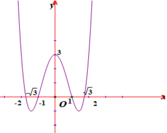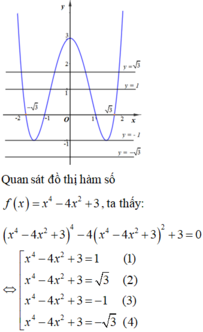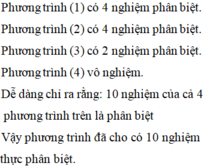Giai phương trình: x4+2x3+4x2+2x+1=0

Những câu hỏi liên quan
phân tích thành nhân tử:
a, (ab-1)2 +( a+b)2 x3 + 2x2 + 2x + 1;
c, x3 - 4x2 + 12x - 27; x4 - 2x3 + 2x -1
d, x4 +2x3+ 2x2 +2x + 1 x2-2x-4y2-4y
e, x4 + 2x3 - 4x -4 x2(1 - x2) - 4 - 4x2
f, (1 + 2x) (1-2x) - x(x+2)(x-2) x2 + y2 - x2y2 + xy- x - y
tìm x
a 5x3-7x2-15x+21=0
b (x-3)2=4x2-20x+25
c x+x2-x3-x4=0
d 2x3+3x2+2x+3=0
b: 4x^2-20x+25=(x-3)^2
=>(2x-5)^2=(x-3)^2
=>(2x-5)^2-(x-3)^2=0
=>(2x-5-x+3)(2x-5+x-3)=0
=>(3x-8)(x-2)=0
=>x=8/3 hoặc x=2
c: x+x^2-x^3-x^4=0
=>x(x+1)-x^3(x+1)=0
=>(x+1)(x-x^3)=0
=>(x^3-x)(x+1)=0
=>x(x-1)(x+1)^2=0
=>\(x\in\left\{0;1;-1\right\}\)
d: 2x^3+3x^2+2x+3=0
=>x^2(2x+3)+(2x+3)=0
=>(2x+3)(x^2+1)=0
=>2x+3=0
=>x=-3/2
a: =>x^2(5x-7)-3(5x-7)=0
=>(5x-7)(x^2-3)=0
=>\(x\in\left\{\dfrac{7}{5};\sqrt{3};-\sqrt{3}\right\}\)
Đúng 1
Bình luận (0)
Bài 1: Giải phương trình:
a) ( x+1)2 (x+2) + ( x – 1)2 ( x- 2) = 12
b) x4 + 3x3 + 4x2 + 3x + 1 = 0
c) x5 – x4 + 3x3 + 3x2 –x + 1 = 0
Bài 2: Chứng minh rằng các phương trình sau vô nghiệm
a) x4 – x3 + 2x2 – x + 1 = 0
b) x4 + x3 + x2 + x + 1 = 0
c) x4 – 2x3 +4x2 – 3x +2 = 0
d) x6+ x5+ x4 + x3 + x2 + x + 1 = 0
1.
a/ \(\Leftrightarrow\left(x+1\right)\left(x^2+3x+2\right)+\left(x-1\right)\left(x^2-3x+2\right)-12=0\)
\(\Leftrightarrow\left(x+1\right)\left(x^2+2\right)+3x\left(x+1\right)-3x\left(x-1\right)+\left(x-1\right)\left(x^2+2\right)-12=0\)
\(\Leftrightarrow2x\left(x^2+2\right)+6x^2-12=0\)
\(\Leftrightarrow x^3+3x^2+2x-6=0\)
\(\Leftrightarrow\left(x-1\right)\left(x^2+4x+6\right)=0\Rightarrow x=1\)
b/ Nhận thấy \(x=0\) ko phải nghiệm, chia 2 vế cho \(x^2\)
\(x^2+\frac{1}{x^2}+3\left(x+\frac{1}{x}\right)+4=0\)
Đặt \(x+\frac{1}{x}=t\Rightarrow x^2+\frac{1}{x^2}=t^2-2\)
\(t^2-2+3t+4=0\Rightarrow t^2+3t+2=0\Rightarrow\left[{}\begin{matrix}t=-1\\t=-2\end{matrix}\right.\)
\(\Rightarrow\left[{}\begin{matrix}x+\frac{1}{x}=-1\\x+\frac{1}{x}=-2\end{matrix}\right.\) \(\Rightarrow\left[{}\begin{matrix}x^2+x+1=0\left(vn\right)\\x^2+2x+1=0\end{matrix}\right.\) \(\Rightarrow x=-1\)
1c/
\(\Leftrightarrow x^5+x^4-2x^4-2x^3+5x^3+5x^2-2x^2-2x+x+1=0\)
\(\Leftrightarrow x^4\left(x+1\right)-2x^3\left(x+1\right)+5x^2\left(x+1\right)-2x\left(x+1\right)+x+1=0\)
\(\Leftrightarrow\left(x+1\right)\left(x^4-2x^3+5x^2-2x+1\right)=0\)
\(\Leftrightarrow\left[{}\begin{matrix}x=-1\\x^4-2x^3+5x^2-2x+1=0\left(1\right)\end{matrix}\right.\)
\(\left(1\right)\Leftrightarrow x^4-2x^3+x^2+x^2-2x+1+3x^2=0\)
\(\Leftrightarrow\left(x^2-x\right)^2+\left(x-1\right)^2+3x^2=0\)
\(\Leftrightarrow\left\{{}\begin{matrix}x^2-x=0\\x-1=0\\x=0\end{matrix}\right.\) \(\Rightarrow\) không tồn tại x thỏa mãn
Vậy pt có nghiệm duy nhất \(x=-1\)
2.
a. \(x^4-x^3+x^2+x^2-x+1=0\)
\(\Leftrightarrow x^2\left(x^2-x+1\right)+x^2-x+1=0\)
\(\Leftrightarrow\left(x^2+1\right)\left(x^2-x+1\right)=0\)
\(\Leftrightarrow\left[{}\begin{matrix}x^2+1=0\left(vn\right)\\x^2-x+1=0\Leftrightarrow\left(x-\frac{1}{2}\right)^2+\frac{3}{4}=0\left(vn\right)\end{matrix}\right.\)
Vậy pt vô nghiệm
b.
\(x^4+x^3+x^2+x+1=0\)
\(\Leftrightarrow x\left(x^3+1\right)+x^3+1+x^2=0\)
\(\Leftrightarrow\left(x+1\right)\left(x^3+1\right)+x^2=0\)
\(\Leftrightarrow\left(x+1\right)^2\left(x^2-x+1\right)+x^2=0\)
Mà \(\left\{{}\begin{matrix}\left(x+1\right)^2\left(x^2-x+1\right)\ge0\\x^2\ge0\end{matrix}\right.\)
Nên dấu "=" xảy ra khi và chỉ khi: \(\left\{{}\begin{matrix}x+1=0\\x=0\end{matrix}\right.\) ko tồn tại x thỏa mãn
Xem thêm câu trả lời
Bài 1: phân tích đa thức thành nhân tửa)x2-y2-2x-2y e)x4-2x3+2x-1b)x2(x+2y)-x-2y f)x4+x3+2x2+x+1c)x3-4x2-9x+36 g)x2y+xy2+x2z+y2z+2xyzd)x4+2x3+2x-1 h)3x3-3y2-2(x-y)2Làm chi tiết giúp mình với ạ , cảm ơn
Đọc tiếp
Bài 1: phân tích đa thức thành nhân tử
a)x2-y2-2x-2y e)x4-2x3+2x-1
b)x2(x+2y)-x-2y f)x4+x3+2x2+x+1
c)x3-4x2-9x+36 g)x2y+xy2+x2z+y2z+2xyz
d)x4+2x3+2x-1 h)3x3-3y2-2(x-y)2
Làm chi tiết giúp mình với ạ , cảm ơn![]()
e) Ta có: \(x^4-2x^3+2x-1\)
\(=\left(x^4-1\right)-2x\left(x^2-1\right)\)
\(=\left(x^2+1\right)\left(x-1\right)\left(x+1\right)-2x\left(x-1\right)\left(x+1\right)\)
\(=\left(x-1\right)\left(x+1\right)\cdot\left(x^2-2x+1\right)\)
\(=\left(x+1\right)\cdot\left(x-1\right)^3\)
h) Ta có: \(3x^2-3y^2-2\left(x-y\right)^2\)
\(=3\left(x^2-y^2\right)-2\left(x-y\right)^2\)
\(=3\left(x-y\right)\left(x+y\right)-2\left(x-y\right)^2\)
\(=\left(x-y\right)\left(3x+3y-2x+2y\right)\)
\(=\left(x-y\right)\left(x+5y\right)\)
Đúng 1
Bình luận (0)
a) Ta có: \(x^2-y^2-2x-2y\)
\(=\left(x-y\right)\left(x+y\right)-2\left(x+y\right)\)
\(=\left(x+y\right)\left(x-y-2\right)\)
b) Ta có: \(x^2\left(x+2y\right)-x-2y\)
\(=\left(x+2y\right)\left(x^2-1\right)\)
\(=\left(x+2y\right)\left(x-1\right)\left(x+1\right)\)
Đúng 1
Bình luận (0)
c) Ta có: \(x^3-4x^2-9x+36\)
\(=x^2\left(x-4\right)-9\left(x-4\right)\)
\(=\left(x-4\right)\left(x^2-9\right)\)
\(=\left(x-4\right)\left(x-3\right)\left(x+3\right)\)
d) Ta có: \(x^4+2x^3+2x-1\)
\(=\left(x^2-1\right)\left(x^2+1\right)+2x\left(x^2+1\right)\)
\(=\left(x^2+1\right)\left(x^2+2x-1\right)\)
Đúng 1
Bình luận (0)
Bài 1:phân tích đa thức thành nhân tửa)x2-2x-4y2-4y e)x4+2x3+2x2+2x+1b)x3+2x2+2x+1 f)x5+x4+x3+x2+x+1c)x3-4x2+12x-27d)a6-a4+2a3+2a2Làm chi tiết giúp mình với ạ, cảm ơn
Đọc tiếp
Bài 1:phân tích đa thức thành nhân tử
a)x2-2x-4y2-4y e)x4+2x3+2x2+2x+1
b)x3+2x2+2x+1 f)x5+x4+x3+x2+x+1
c)x3-4x2+12x-27
d)a6-a4+2a3+2a2
Làm chi tiết giúp mình với ạ, cảm ơn
a) \(x^2-2x-4y^2-4y=\left(x^2-4y^2\right)-\left(2x+4y\right)=\left(x-2y\right)\left(x+2y\right)-2\left(x+2y\right)=\left(x+2y\right)\left(x-2y-2\right)\)
b) \(x^3+2x^2+2x+1=\left(x+1\right)\left(x^2-x+1\right)+2x\left(x+1\right)=\left(x+1\right)\left(x^2-x+1+2x\right)=\left(x+1\right)\left(x^2+x+1\right)\)
c) \(x^3-4x^2+12x-27=x^3-3x^2-x^2+3x+9x-27=x^2\left(x-3\right)-x\left(x-3\right)+9\left(x-3\right)=\left(x-3\right)\left(x^2-x+9\right)\)
d) \(a^6-a^4+2a^3+2a^2=a^2\left(a^4-a^2+2a+2\right)=a^2\left[a^2\left(a-1\right)\left(a+1\right)+2\left(a+1\right)\right]=a^2\left(a+1\right)\left(a^3-a^2+2\right)=a^2\left(a+1\right)\left[a^3+a^2-2a^2+2\right]=a^2\left(a+1\right)\left[a^2\left(a+1\right)-2\left(a-1\right)\left(a+1\right)\right]=a^2\left(a+1\right)^2\left(a^2-2a+2\right)\)
Đúng 2
Bình luận (0)
a) Ta có: \(x^2-2x-4y^2-4y\)
\(=\left(x^2-4y^2\right)-\left(2x+4y\right)\)
\(=\left(x-2y\right)\left(x+2y\right)-2\left(x+2y\right)\)
\(=\left(x+2y\right)\left(x-2y-2\right)\)
b) Ta có: \(x^3+2x^2+2x+1\)
\(=\left(x^3+1\right)+2x\left(x+1\right)\)
\(=\left(x+1\right)\left(x^2-x+1\right)+2x\left(x+1\right)\)
\(=\left(x+1\right)\left(x^2+x+1\right)\)
Đúng 1
Bình luận (0)
d) Ta có: \(a^6-a^4+2a^3+2a^2\)
\(=a^2\left(a^4-a^2+2a+2\right)\)
\(=a^2\left[a^2\left(a^2-1\right)+\left(2a+2\right)\right]\)
\(=a^2\left[a^2\left(a-1\right)\left(a+1\right)+2\left(a+1\right)\right]\)
\(=a^2\cdot\left(a+1\right)\left(a^3-a+2\right)\)
c) Ta có: \(x^3-4x^2+12x-27\)
\(=\left(x^3-27\right)-\left(4x^2-12x\right)\)
\(=\left(x-3\right)\left(x^2+3x+9\right)-4x\left(x-3\right)\)
\(=\left(x-3\right)\left(x^2-x+9\right)\)
Đúng 1
Bình luận (0)
Xem thêm câu trả lời
Tìm m để bất phương trình:
x
4
−
4
x
2
−
m
+
1
≤
0
có nghiệm thực A.
m
≥
−
3
B.
m
≤
1
C.
m
≥
1
D.
m
≤
−
3
Đọc tiếp
Tìm m để bất phương trình: x 4 − 4 x 2 − m + 1 ≤ 0 có nghiệm thực
A. m ≥ − 3
B. m ≤ 1
C. m ≥ 1
D. m ≤ − 3
Đáp án A
Bất phương trình ⇔ x 4 − 4 x 2 + 4 ≤ x 2 − 2 2 ≤ m + 3
Để bất phương trình có nghiệm thực thì m + 3 ≥ min x 2 − 2 2 = 0 ⇔ m ≥ − 3
Đúng 0
Bình luận (0)
Tìm nghiệm:
a)2x4-3x3-6x2-x+2=0
b)x4-2x3+4x2-3x-1=0
Cho hàm số
f
x
x
4
-
4
x
2
+
3
có đồ thị là đường cong trong hình bên. Hỏi phương trình
x
4
-
4
x
2
+
3
4...
Đọc tiếp
Cho hàm số f x = x 4 - 4 x 2 + 3 có đồ thị là đường cong trong hình bên. Hỏi phương trình x 4 - 4 x 2 + 3 4 - 4 x 4 - 4 x 2 + 3 2 + 3 = 0 có bao nhiêu nghiệm thực phân biệt

A. 8
B. 10
C. 8
D. 4
Cho hàm số
y
f
x
x
4
-
4
x
2
+
3
có đồ thị là đường cong trong hình vẽ bên. Hỏi phương trình
x...
Đọc tiếp
Cho hàm số y = f x = x 4 - 4 x 2 + 3 có đồ thị là đường cong trong hình vẽ bên. Hỏi phương trình x 4 - 4 x 2 + 3 2 - 4 x 4 - 4 x 2 + 3 2 + 3 = 0 có bao nhiêu nghiệm thực phân biệt?

A. 9.
B. 10.
C.8.
D. 4
Chọn đáp án B

Ta có
![]()

Quan sát đồ thị của hàm số y = f(x) ta thấy:
Phương trình f x = - 3 không có nghiệm; phương trình f x = - 1 có 2 nghiệm;
phương trình f x = 1 có 4 nghiệm; phương trình f x = 3 có 4 nghiệm.
Vậy phương trình x 4 - 4 x 2 + 3 2 - 4 x 4 - 4 x 2 + 3 2 + 3 = 0 có 10 nghiệm.
Đúng 0
Bình luận (0)
a) x3 + x2 + x + 1 = 0
b) x3 - 6x2 + 11x - 6 = 0
c) x3 - x2 - 21x + 45 = 0
d) x4 + 2x3 - 4x2 - 5x - 6 = 0
a) Ta có: \(x^3+x^2+x+1=0\)
\(\Leftrightarrow x^2\left(x+1\right)+\left(x+1\right)=0\)
\(\Leftrightarrow\left(x+1\right)\left(x^2+1\right)=0\)
mà \(x^2+1>0\forall x\)
nên x+1=0
hay x=-1
Vậy: S={-1}
b) Ta có: \(x^3-6x^2+11x-6=0\)
\(\Leftrightarrow x^3-x^2-5x^2+5x+6x-6=0\)
\(\Leftrightarrow x^2\left(x-1\right)-5x\left(x-1\right)+6\left(x-1\right)=0\)
\(\Leftrightarrow\left(x-1\right)\left(x^2-5x+6\right)=0\)
\(\Leftrightarrow\left(x-1\right)\left(x-2\right)\left(x-3\right)=0\)
\(\Leftrightarrow\left[{}\begin{matrix}x-1=0\\x-2=0\\x-3=0\end{matrix}\right.\Leftrightarrow\left[{}\begin{matrix}x=1\\x=2\\x=3\end{matrix}\right.\)
Vậy: S={1;2;3}
c) Ta có: \(x^3-x^2-21x+45=0\)
\(\Leftrightarrow x^3-3x^2+2x^2-6x-15x+45=0\)
\(\Leftrightarrow x^2\left(x-3\right)+2x\left(x-3\right)-15\left(x-3\right)=0\)
\(\Leftrightarrow\left(x-3\right)\left(x^2+2x-15\right)=0\)
\(\Leftrightarrow\left(x-3\right)\left(x^2+5x-3x-15\right)=0\)
\(\Leftrightarrow\left(x-3\right)^2\cdot\left(x+5\right)=0\)
\(\Leftrightarrow\left[{}\begin{matrix}x-3=0\\x+5=0\end{matrix}\right.\Leftrightarrow\left[{}\begin{matrix}x=3\\x=-5\end{matrix}\right.\)
Vậy: S={3;-5}
d) Ta có: \(x^4+2x^3-4x^2-5x-6=0\)
\(\Leftrightarrow x^4-2x^3+4x^3-8x^2+4x^2-8x+3x-6=0\)
\(\Leftrightarrow x^3\left(x-2\right)+4x^2\cdot\left(x-2\right)+4x\left(x-2\right)+3\left(x-2\right)=0\)
\(\Leftrightarrow\left(x-2\right)\left(x^3+4x^2+4x+3\right)=0\)
\(\Leftrightarrow\left(x-2\right)\left(x^3+3x^2+x^2+4x+3\right)=0\)
\(\Leftrightarrow\left(x-2\right)\left[x^2\left(x+3\right)+\left(x+1\right)\left(x+3\right)\right]=0\)
\(\Leftrightarrow\left(x-2\right)\left(x+3\right)\left(x^2+x+1\right)=0\)
mà \(x^2+x+1>0\forall x\)
nên (x-2)(x+3)=0
\(\Leftrightarrow\left[{}\begin{matrix}x-2=0\\x+3=0\end{matrix}\right.\Leftrightarrow\left[{}\begin{matrix}x=2\\x=-3\end{matrix}\right.\)
Vậy: S={2;-3}
Đúng 1
Bình luận (0)


















